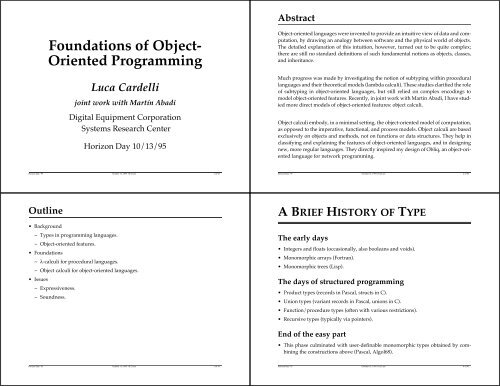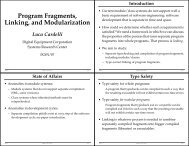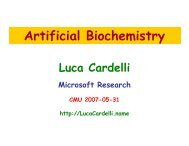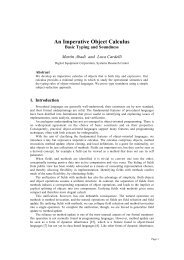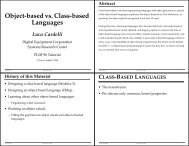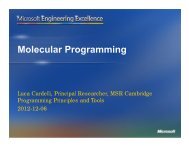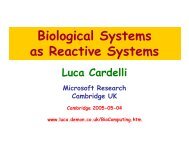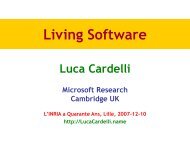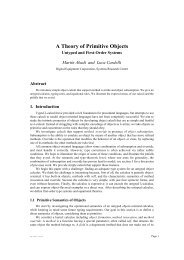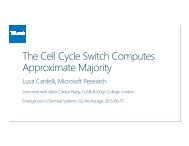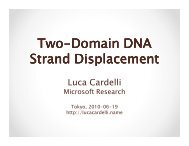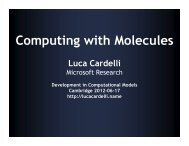Foundations of Object- Oriented Programming - Luca Cardelli
Foundations of Object- Oriented Programming - Luca Cardelli
Foundations of Object- Oriented Programming - Luca Cardelli
You also want an ePaper? Increase the reach of your titles
YUMPU automatically turns print PDFs into web optimized ePapers that Google loves.
Abstract<br />
<strong>Foundations</strong> <strong>of</strong> <strong>Object</strong>-<br />
<strong>Oriented</strong> <strong>Programming</strong><br />
<strong>Luca</strong> <strong>Cardelli</strong><br />
joint work with Mart’n Abadi<br />
Digital Equipment Corporation<br />
Systems Research Center<br />
Horizon Day 10/13/95<br />
<strong>Object</strong>-oriented languages were invented to provide an intuitive view <strong>of</strong> data and computation,<br />
by drawing an analogy between s<strong>of</strong>tware and the physical world <strong>of</strong> objects.<br />
The detailed explanation <strong>of</strong> this intuition, however, turned out to be quite complex;<br />
there are still no standard definitions <strong>of</strong> such fundamental notions as objects, classes,<br />
and inheritance.<br />
Much progress was made by investigating the notion <strong>of</strong> subtyping within procedural<br />
languages and their theoretical models (lambda calculi). These studies clarified the role<br />
<strong>of</strong> subtyping in object-oriented languages, but still relied on complex encodings to<br />
model object-oriented features. Recently, in joint work with Martin Abadi, I have studied<br />
more direct models <strong>of</strong> object-oriented features: object calculi.<br />
<strong>Object</strong> calculi embody, in a minimal setting, the object-oriented model <strong>of</strong> computation,<br />
as opposed to the imperative, functional, and process models. <strong>Object</strong> calculi are based<br />
exclusively on objects and methods, not on functions or data structures. They help in<br />
classifying and explaining the features <strong>of</strong> object-oriented languages, and in designing<br />
new, more regular languages. They directly inspired my design <strong>of</strong> Obliq, an object-oriented<br />
language for network programming.<br />
Horizon Day ‘95 October 15, 1995 10:23 am 1 <strong>of</strong> 43<br />
Horizon Day ‘95 October 15, 1995 10:23 am 2 <strong>of</strong> 43<br />
Outline<br />
¥ Background<br />
~ Types in programming languages.<br />
~ <strong>Object</strong>-oriented features.<br />
¥ <strong>Foundations</strong><br />
~ λ-calculi for procedural languages.<br />
~ <strong>Object</strong> calculi for object-oriented languages.<br />
¥ Issues<br />
~ Expressiveness.<br />
~ Soundness.<br />
A BRIEF HISTORY OF TYPE<br />
The early days<br />
¥ Integers and floats (occasionally, also booleans and voids).<br />
¥ Monomorphic arrays (Fortran).<br />
¥ Monomorphic trees (Lisp).<br />
The days <strong>of</strong> structured programming<br />
¥ Product types (records in Pascal, structs in C).<br />
¥ Union types (variant records in Pascal, unions in C).<br />
¥ Function/procedure types (<strong>of</strong>ten with various restrictions).<br />
¥ Recursive types (typically via pointers).<br />
End <strong>of</strong> the easy part<br />
¥ This phase culminated with user-definable monomorphic types obtained by combining<br />
the constructions above (Pascal, Algol68).<br />
Horizon Day ‘95 October 15, 1995 10:23 am 3 <strong>of</strong> 43<br />
Horizon Day ‘95 October 15, 1995 10:23 am 4 <strong>of</strong> 43
Four major innovations<br />
Polymorphism (ML, etc.).<br />
Abstract types (CLU, etc.).<br />
Modules (Modula 2, etc.).<br />
(Impredicative universal types.)<br />
(Impredicative existentials types.)<br />
(Predicative dependent types.)<br />
<strong>Object</strong>s and subtyping (Simula 67, etc.). (Subtyping + ???)<br />
¥ The first three innovations are now largely understood, in isolation, both theoretically<br />
and practically. Some <strong>of</strong> their combinations are also well understood.<br />
¥ There has been little agreement on the theoretical and practical properties <strong>of</strong> objects.<br />
¥ Despite much progress, nobody really knows yet how to combine all four ingredients<br />
into coherent language designs.<br />
Confusion<br />
These four innovations are partially overlapping and certainly interact in interesting<br />
ways. It is not clear which ones should be taken as more prominent. E.g.:<br />
¥ <strong>Object</strong>-oriented languages have tried to incorporate type abstraction, polymorphism,<br />
and modularization all at once. As a result, o-o languages are (generally) a<br />
mess. Much effort has been dedicated to separating these notions back again.<br />
¥ Claims have been made (at least initially) that objects can be subsumed by either<br />
higher-order functions and polymorphism (ML camp), by data abstraction (CLU<br />
camp), or by modularization (ADA camp).<br />
¥ One hard fact is that full-blown polymorphism can subsume data abstraction. But<br />
this kind <strong>of</strong> polymorphism is more general than, e.g., MLÕs, and it is not yet clear<br />
how to handle it in practice.<br />
¥ Modules can be used to obtain some form <strong>of</strong> polymorphism and data abstraction<br />
(ADA generics, C++ templates) (Modula 2 opaque types), but not in full generality.<br />
Horizon Day ‘95 October 15, 1995 10:23 am 5 <strong>of</strong> 43<br />
Horizon Day ‘95 October 15, 1995 10:23 am 6 <strong>of</strong> 43<br />
O-O PROGRAMMING<br />
¥ Goals<br />
~ Data abstraction.<br />
~ Polymorphism.<br />
~ Code reuse.<br />
¥ Mechanisms<br />
~ <strong>Object</strong>s with self (packages <strong>of</strong> data and code).<br />
~ Subtyping and subsumption.<br />
~ Classes and inheritance.<br />
<strong>Object</strong>-oriented constructs<br />
<strong>Object</strong>s and object types<br />
<strong>Object</strong>s are packages <strong>of</strong> data (instance variables) and code (methods).<br />
<strong>Object</strong> types describe the shape <strong>of</strong> objects.<br />
<strong>Object</strong>Type CellType;<br />
var contents: Integer;<br />
method get(): Integer;<br />
method set(n: Integer);<br />
end;<br />
object cell: CellType;<br />
var contents: Integer := 0;<br />
method get(): Integer; return self.contents end;<br />
method set(n: Integer); self.contents := n end;<br />
end;<br />
where a : A means that the program a has type A. So, cell : CellType.<br />
Horizon Day ‘95 October 15, 1995 10:23 am 7 <strong>of</strong> 43<br />
Horizon Day ‘95 October 15, 1995 10:23 am 8 <strong>of</strong> 43
Classes<br />
Classes are ways <strong>of</strong> describing and generating collections <strong>of</strong> objects.<br />
class cellClass for CellType;<br />
var contents: Integer := 0;<br />
method get(): Integer; return self.contents end;<br />
method set(n: Integer); self.contents := n end;<br />
end;<br />
var cell : CellType := new cellClass;<br />
procedure double(aCell: CellType);<br />
aCell.set(2 * aCell.get());<br />
end;<br />
Subclasses<br />
Subclasses are ways <strong>of</strong> describing classes incrementally, reusing code.<br />
<strong>Object</strong>Type ReCellType;<br />
var contents: Integer;<br />
var backup: Integer;<br />
method get(): Integer;<br />
method set(n: Integer);<br />
method restore();<br />
end;<br />
subclass reCellClass <strong>of</strong> cellClass for ReCellType;<br />
(Inherited:<br />
var backup: Integer := 0; var contents<br />
override set(n: Integer); method get)<br />
self.backup := self.contents;<br />
super.set(n);<br />
end;<br />
method restore(); self.contents := self.backup end;<br />
end;<br />
Horizon Day ‘95 October 15, 1995 10:23 am 9 <strong>of</strong> 43<br />
Horizon Day ‘95 October 15, 1995 10:23 am 10 <strong>of</strong> 43<br />
Subtyping and subsumption<br />
¥ Subtyping relation, A
The λ-calculus<br />
The simplest procedural language.<br />
b ::=<br />
x<br />
λ(x)b<br />
b 1 (b 2 )<br />
x := b<br />
terms<br />
identifiers<br />
functions<br />
applications<br />
assignments<br />
(i.e. procedure (x) return b end)<br />
... also the hardest procedural language.<br />
~ Scoping (cf. LispÕs botch, AlgolÕs blocks).<br />
~ Data structures (numbers, trees, etc.).<br />
~ Controls structures (parameters, declarations, state encapsulation,<br />
conditionals, loops, recursion, continuations).<br />
~ module structures (interfaces, genericity, visibility).<br />
~ Typing (soundness, polymorphism, data abstraction).<br />
~ Semantics (formal language definitions).<br />
¥ Functional Semantics:<br />
(λ(x)b)(b 1 ) Òñ b{x←b 1 }<br />
(β-reduction)<br />
¥ Imperative Semantics:<br />
more complicated, store-based.<br />
Horizon Day ‘95 October 15, 1995 10:23 am 13 <strong>of</strong> 43<br />
Horizon Day ‘95 October 15, 1995 10:23 am 14 <strong>of</strong> 43<br />
The Functional Point <strong>of</strong> View<br />
¥ Functions (or procedures) are the most interesting aspect <strong>of</strong> computation.<br />
¥ Various λ-calculi are seen both as paradigms and foundations for procedural languages.<br />
(E.g.: Landin/Reynolds for Algol, Milner for ML.)<br />
According to the functional approach, objects, like anything else, ought to be explained<br />
by some combination <strong>of</strong> functions.<br />
But people working on and with object-oriented language do not think that functions<br />
are so interesting ...<br />
However...<br />
¥ The Simula lament:<br />
ÒUnlike procedural languages, object-oriented languages have no formal<br />
foundation.Ó<br />
(I.e.: We made it up.)<br />
¥ The Smalltalk axiom:<br />
ÒEverything is an object. I mean, EVERYTHING.Ó<br />
(I.e.: If you have objects, you donÕt need functions.)<br />
¥ The C++ / Eiffel / etc. trade press:<br />
ÒA revolutionary s<strong>of</strong>tware life-cycle paradigm.Ó<br />
(I.e.: DonÕt call procedures, invoke methods!)<br />
They all say: These are no ordinary languages.<br />
They reject the reductionist approach <strong>of</strong> mapping everything to the λ-calculus.<br />
Horizon Day ‘95 October 15, 1995 10:23 am 15 <strong>of</strong> 43<br />
Horizon Day ‘95 October 15, 1995 10:23 am 16 <strong>of</strong> 43
If there is something really unique to O-O,<br />
then ...<br />
There ought to be a formalism comparable to the λ-calculus, such that:<br />
¥ It is computationally complete.<br />
¥ It is based entirely on objects, not functions.<br />
¥ It can be used as a paradigm and a foundation for object-oriented language.<br />
¥ It can explain object-oriented concepts more directly and fruitfully than functional<br />
encodings.<br />
Some evidence to the contrary:<br />
¥ <strong>Object</strong>s have methods, methods have parameters, parameters are λÕs, therefore any<br />
object formalism is an extension <strong>of</strong> the λ-calculus, not a replacement for it.<br />
And yet...<br />
The ς-calculus<br />
The simplest object-oriented language.<br />
b ::=<br />
x<br />
[l i = ς(x i )b i iÏ1..n ]<br />
b.l<br />
b 1 .l fiü ς(x)b 2<br />
clone(b)<br />
let x = b 1 in b 2<br />
¥ Fields can be encoded:<br />
[..., l = b, ... ]<br />
b 1 .l := b 2<br />
terms<br />
identifiers<br />
objects (i.e. object[l = method()...self...end, ...])<br />
method invocation (with no parameters)<br />
method update<br />
cloning<br />
local declaration (yields fields)<br />
Horizon Day ‘95 October 15, 1995 10:23 am 17 <strong>of</strong> 43<br />
Horizon Day ‘95 October 15, 1995 10:23 am 18 <strong>of</strong> 43<br />
Reduction rules <strong>of</strong> the ς-calculus<br />
¥ The notation b Òñ c means that b reduces to c.<br />
Let o 7 [l i =ς(x i )b iÏ1..n i ]<br />
(l i distinct)<br />
o.l j Òñ b j {x j ←o} (jÏ1..n)<br />
o.l j fiüς(y)b Òñ [l j =ς(y)b, l i =ς(x i )b iÏ(1..n)-{j} i ] (jÏ1..n)<br />
Theorem: Church-Rosser<br />
If a îïññ b and a îïññ c, then there exists d such that b îïññ d and c îïññ d.<br />
(Where îïññ is the reflexive, transitive, and contextual closure <strong>of</strong> Òñ.)<br />
~ We are dealing with a calculus <strong>of</strong> objects (not <strong>of</strong> functions).<br />
~ The semantics is deterministic. It is neither imperative nor concurrent.<br />
~ We have investigated imperative versions <strong>of</strong> the calculus.<br />
~ We have not yet investigated a concurrent version.<br />
Basic Examples<br />
Let o 1 @ [l=ς(x)[]] A convergent method.<br />
then o 1 .l Òñ []<br />
Let o 2 @ [l=ς(x)x.l] A divergent method.<br />
then o 2 .l Òñ x.l{x←o 2 } 7 o 2 .l Òñ ...<br />
Let o 3 @ [l = ς(x)x] A self-returning method.<br />
then o 3 .l Òñ x{x←o 3 } 7 o 3<br />
Let o 4 @ [l = ς(y) (y.lfiüς(x)x)] A self-modifying method.<br />
then o 4 .l Òñ (o 4 .lfiüς(x)x) Òñ o 3<br />
Horizon Day ‘95 October 15, 1995 10:23 am 19 <strong>of</strong> 43<br />
Horizon Day ‘95 October 15, 1995 10:23 am 20 <strong>of</strong> 43
... also the hardest object-oriented language.<br />
~ role <strong>of</strong> self (hidden recursion)<br />
~ data structures (numbers, trees, etc.)<br />
~ controls structures (functions, classes, state encapsulation,<br />
conditionals, loops, recursion)<br />
~ typing (soundness, subtyping, Self types)<br />
~ semantics (formal o-o language definitions)<br />
A.k.a. Obliq<br />
b ::=<br />
x<br />
{l i => meth(x i )b i end iÏ1..n }<br />
b.l<br />
b 1 .l := meth(x)b 2 end<br />
clone(b)<br />
let x = b 1 in b 2 end<br />
terms<br />
identifiers<br />
objects<br />
method invocation<br />
method update<br />
cloning<br />
local declaration (yields fields)<br />
Horizon Day ‘95 October 15, 1995 10:23 am 21 <strong>of</strong> 43<br />
Horizon Day ‘95 October 15, 1995 10:23 am 22 <strong>of</strong> 43<br />
Functions from <strong>Object</strong>s<br />
äxã @ x<br />
äb(a)ã @ (äbã.arg fiü ς(x)äaã).val<br />
äλ(x)b{x}ã @<br />
[arg = ς(x) x.arg,<br />
val = ς(x) äb{x}ãYx←x.argZ]<br />
x Ì FV(a)<br />
¥ β-reduction is validated:<br />
let o 7 [arg = ς(z) äaã, val = ς(x) äb{x}ã{x←x.arg}]<br />
ä(λ(x)b{x})(a)ã<br />
7 ([arg = ς(x) x.arg, val = ς(x) äb{x}ã{x←x.arg}].arg fiü ς(z)äaã).val<br />
= o.val = (äb{x}ã{x←x.arg}){x←o}<br />
= äb{x}ã{x←o.arg} = äb{x}ã{x←äaã}<br />
= äb{a}ã<br />
Example:<br />
ä(λ(x)x)(a)ã 7 ([arg = ς(x) x.arg, val = ς(x)äxã{x←x.arg}].arg fiü ς(z)äaã).val<br />
Òñ äaã<br />
¥ Roughly the same technique extends to imperative calculi, and to various typed calculi.<br />
¥ Generalizes to default parameters and call-by-keyword.<br />
¥ Thus, procedural languages are reduced to object-oriented languages.<br />
Preview: this encoding extends to typed calculi:<br />
äA→Bã @ [arg: äAã, val: äBã]<br />
1 st -order λ into 1 st -order ς<br />
Horizon Day ‘95 October 15, 1995 10:23 am 23 <strong>of</strong> 43<br />
Horizon Day ‘95 October 15, 1995 10:23 am 24 <strong>of</strong> 43
<strong>Object</strong>s from Functions<br />
Example: A Storage Cell<br />
äxã @ x<br />
ä[l i = ς(x i )b iÏ1..n i ]ã @ Ül i = λ(x i )äb i ã iÏ1..n á<br />
äb.lã @ äbã.l(äbã)<br />
äb 1 .l fiü ς(x)b 2 ã @ äb 1 ã.l:=λ(x)äb 2 ã<br />
Preview: this translation does not extend to typed calculi.<br />
[l i :B iÏ1..n i ] @ µ(X)Ül i :X→B iÏ1..n i á<br />
But NOT, e.g.: µ(X)Ül:X→A, lÕ:X→Bá
¥ If o 7 [l i =ς(x i )b iÏ1..n i ] is an object,<br />
c 7 [l i = λ(x i )b iÏ1..n i ,<br />
new = ς(z)[l i = ς(s) z.l i (s) iÏ1..n ] ]<br />
then c is a class for generating objects like o.<br />
¥ A (sub)class cÕ may inherit pre-methods from c:<br />
cÕ 7 [..., l k = c.l k , ...<br />
new = ... ]<br />
¥ Roughly the same technique extends to imperative calculi, and to various typed calculi.<br />
¥ Thus, class-based languages are reduced to object-based languages.<br />
<strong>Object</strong> Types<br />
An object type<br />
[l i :B iÏ1..n i ]<br />
is the type <strong>of</strong> those objects with methods l i , with a self parameter <strong>of</strong> type A
With some additional, standard rules we obtain a complete calculus:<br />
(Env apple) (Env x) (Val x)<br />
E ∫ A xÌdom(E) EÕ,x:A,EÓ ∫ Q<br />
apple ∫ Q E,x:A ∫ Q EÕ,x:A,EÓ ∫ x:A<br />
(Sub Refl) (Sub Trans) (Val Subsumption)<br />
E ∫ A E ∫ A
Inheritance<br />
Define inheritance as a new relation between class types:<br />
Untyped Translations<br />
¥ Give insights into the nature <strong>of</strong> object-oriented computation.<br />
Class(AÕ) may inherit from Class(A) iff AÕ
CONCLUSIONS<br />
¥ Expressiveness<br />
~ Pure object-based languages are as expressive as procedural languages. (Despite<br />
all the Smalltalk claims, to our knowledge nobody had previously shown formally<br />
that one can build functions out <strong>of</strong> objects.)<br />
~ Classes can be easily and faithfully encoded into object calculi. Thus, object-based<br />
languages are simpler and just as expressive as class-based ones. (To our knowledge,<br />
nobody had previously shown that one can build type-correct classes out <strong>of</strong><br />
objects.)<br />
¥ Language soundness<br />
~ The simple untyped ς-calculus is a good foundation for studying rich object-oriented<br />
type systems (including polymorphism, Self types, etc.) and to prove their<br />
soundness. We have done much work in this area.<br />
~ Practical object-oriented languages can be shown sound by fairly direct subtypepreserving<br />
translations into object calculi.<br />
~ We can make (some) sense <strong>of</strong> object-oriented languages.<br />
¥ <strong>Foundations</strong><br />
~ Subtype-preserving translations <strong>of</strong> object calculi, into lambda-calculi are extremely<br />
difficult to obtain.<br />
~ In contrast, subtype-preserving translations <strong>of</strong> lambda-calculi into object-calculi<br />
can be easily obtained.<br />
~ In this sense, object calculi are more fundamental than λ-calculi.<br />
¥ Other developments<br />
~ Imperative calculi.<br />
~ Second-order object types for ÒSelf typesÓ.<br />
~ Higher-order object types for ÒmatchingÓ.<br />
¥ Potential future areas<br />
~ Typed ς-calculi should be a good simple foundation for studying object-oriented<br />
specification and verification (a still largely underdeveloped area).<br />
~ They should also give us a formal platform for studying object-oriented concurrent<br />
languages (as opposed to ÒordinaryÓ concurrent languages).<br />
Horizon Day ‘95 October 15, 1995 10:23 am 41 <strong>of</strong> 43<br />
Horizon Day ‘95 October 15, 1995 10:23 am 42 <strong>of</strong> 43<br />
References<br />
http://www.research.digital.com/SRC/<br />
personal/<strong>Luca</strong>_<strong>Cardelli</strong>/TheoryOf<strong>Object</strong>s.html<br />
Horizon Day ‘95 October 15, 1995 10:23 am 43 <strong>of</strong> 43


